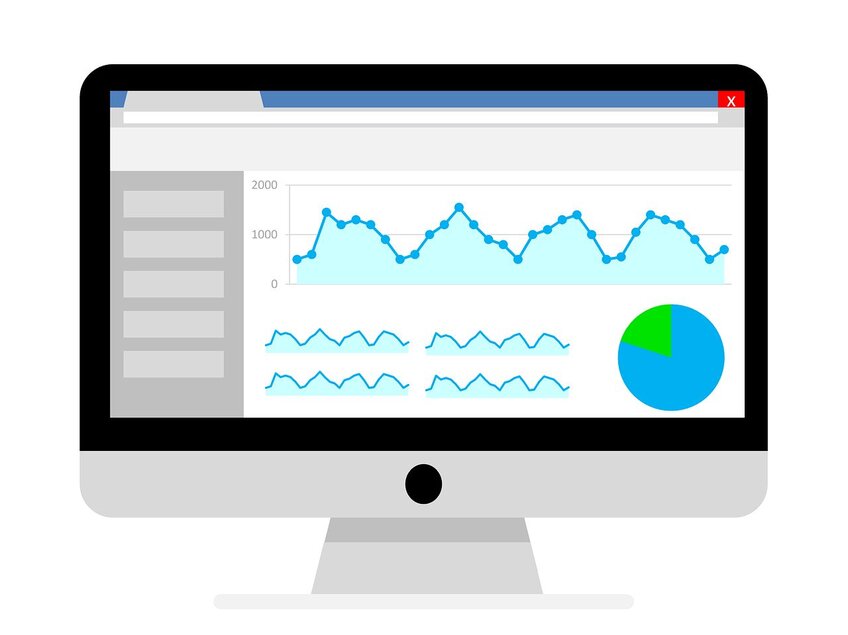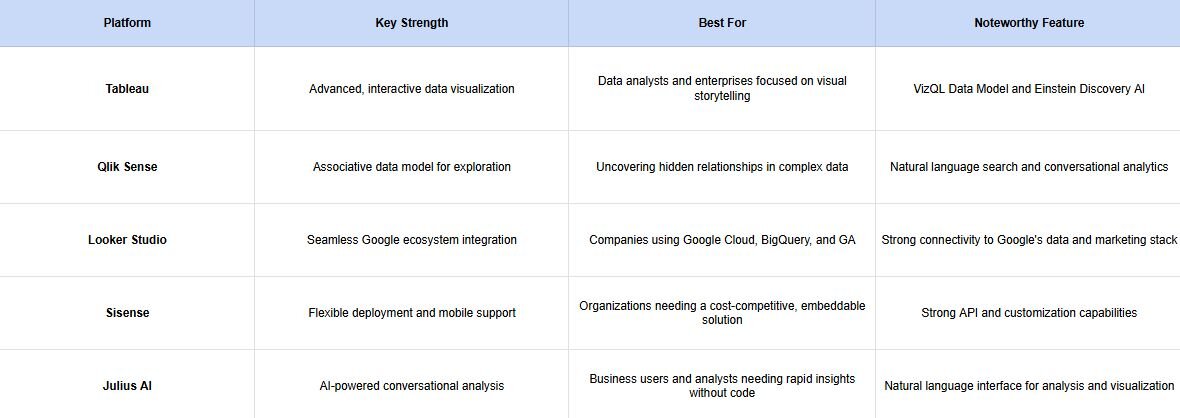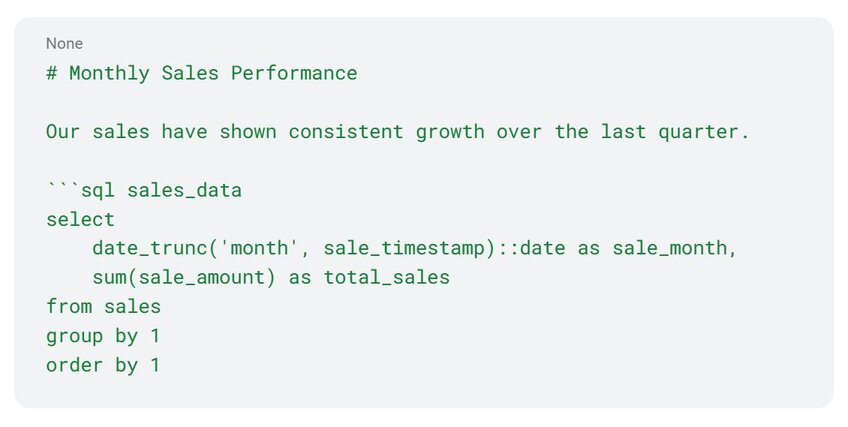July 15th, 2025
Compare Leading Data Platforms: Best Power BI Alternatives
By Simon Avila · 4 min read

Microsoft Power BI is a leading tool in the business intelligence (BI) space, valued for its affordability and integration with the Microsoft ecosystem [1]. As the global data analytics market expands, the need for diverse and specialized tools continues to grow. This growth is driven by increasing data complexity and the demand for predictive analytics, making a one-size-fits-all approach to BI insufficient. Organizations seek Power BI alternatives for advanced data visualization, different data modeling capabilities, or integration with non-Microsoft tech stacks.
Why Look Beyond Power BI?
Several factors drive businesses to explore alternatives:
• Advanced Visualization: Some platforms offer more sophisticated and interactive visualization capabilities.
• Data Modeling: While Power BI uses a standard relational model, alternatives like Qlik Sense offer an associative model that can reveal hidden insights by showing how all data is related [2].
• Ecosystem Integration: Companies invested in Google Cloud or other ecosystems may prefer alternatives like Looker Studio for seamless integration [3].
• Cost and Licensing: Although Power BI is competitively priced, enterprise-level features can increase the total cost of ownership and lead some to evaluate platforms with different pricing models [2].
• User Experience and Learning Curve: Depending on the user base, some platforms may offer a more intuitive or specialized user experience.
Top Power BI Alternatives: A Quick Comparison
To navigate the landscape, here is a high-level comparison of leading data platforms.

Deep Dive into Leading Competitors
Tableau: The Visualization Powerhouse
Tableau is often the first name that comes up when discussing Power BI alternatives. It has built its reputation on providing a best-in-class, self-service analytics platform focused on visual exploration [2].
• Strengths: Its drag-and-drop interface makes creating complex and beautiful visualizations intuitive for data analysts. Features like the VizQL Data Model and AI-powered explanations via Einstein Discovery are industry-leading, allowing users to quickly understand the "why" behind their data [3].
• Weaknesses: Tableau's power comes at a price. It typically has higher ongoing costs than Power BI, and some users report performance limitations when working with extremely large and complex datasets [2].
Qlik Sense: The Associative Engine
• Strengths: This associative model is incredibly powerful for uncovering insights you weren't looking for. Qlik also offers robust AI-driven insights, natural language search, and flexible deployment options, including SaaS and on-premises solutions [2]. Its cloud-native architecture provides elasticity to scale with demand [3].
• Weaknesses: The platform can have a steeper learning curve for beginners compared to Power BI, and its pricing model can be complex to navigate [2].
Exploring Niche and Emerging Alternatives
The BI market is not just a two-horse race. Many other platforms cater to specific needs, from code-first development to AI-driven accessibility.
For the Code-First Data Team: Holistics & Evidence.dev
For data teams that prioritize version control, scalability, and a code-based workflow, tools like Holistics and Evidence.dev are compelling alternatives.
• Holistics is a BI platform built for data teams. It features SQL-based data modeling and integrates with Git for version control, allowing for a more robust and maintainable analytics workflow [1].
• Evidence.dev is an open-source tool that lets you build data-driven reports using only SQL and Markdown. This is ideal for SQL-savvy users who want to quickly transform queries into interactive reports with rich narrative context [4].
Here’s a simple example of how you might create a chart in Evidence.dev:

For Budget-Conscious Teams: Zoho Analytics
For small to medium-sized businesses or teams with tight budgets, Zoho Analytics is an excellent choice. It offers a free plan, strong data connectivity, and powerful historical reporting capabilities, making it a highly accessible entry point into business intelligence [4].
The AI-Powered Approach: Julius AI
A new wave of BI tools is emerging, focused on democratizing data analysis through artificial intelligence. Julius AI is a prime example of this trend. It's an AI-powered data analysis platform that allows users to analyze data, create visualizations, and generate insights using a simple, conversational interface.
Instead of navigating complex menus or writing code, you can ask questions in plain English, like "What were our top 5 products by sales last quarter?" or "Create a chart showing the correlation between marketing spend and website traffic." Julius interprets the request, performs the analysis, and returns the answer, often with a corresponding chart or table.
This approach is ideal for knowledge workers who need data-driven answers but don't have dedicated analyst support, and for data scientists who want to automate routine analysis and visualization tasks. It directly addresses a key market trend: the democratization of data science, making powerful analytics accessible to a broader audience.
How to Choose the Right Platform for Your Business
Choosing the right BI tools starts with understand your organization’s unique needs. Ask yourself the following:
• Your Users: Are they expert data analysts who can leverage the full power of Tableau, or business users who would benefit from the conversational approach of a tool like Julius AI?
• Your Budget: Evaluate the total cost of ownership, including licensing, training, and maintenance. Budget-friendly options like Zoho Analytics can be a great starting point [4].
• Your Tech Stack: How well does the platform integrate with your existing systems? If you're a Google shop, Looker Studio is a natural fit. If you need flexibility, look for platforms with robust APIs and data connectors [3].
• Your Use Case: Are you focused on creating pixel-perfect dashboards for executives, enabling deep ad-hoc exploration for analysts, or embedding analytics into your product?
Final Thoughts: The Future is Diverse and AI-Driven
The data science platform market is set for significant growth. In this dynamic environment, there is no single "best" Power BI alternative. The right choice is the one that aligns with your team's skills, budget, and strategic goals.
The market is diversifying, with established giants like Tableau and Qlik offering deep analytical power, while newer, innovative platforms like Julius AI are leveraging AI to make data analysis more accessible than ever before. By carefully evaluating your needs against the rich landscape of available tools, you can find the perfect platform to turn your data into a strategic asset.
Want to see why over 2 million users trust Julius for their business intelligence needs? Try it for free today.
